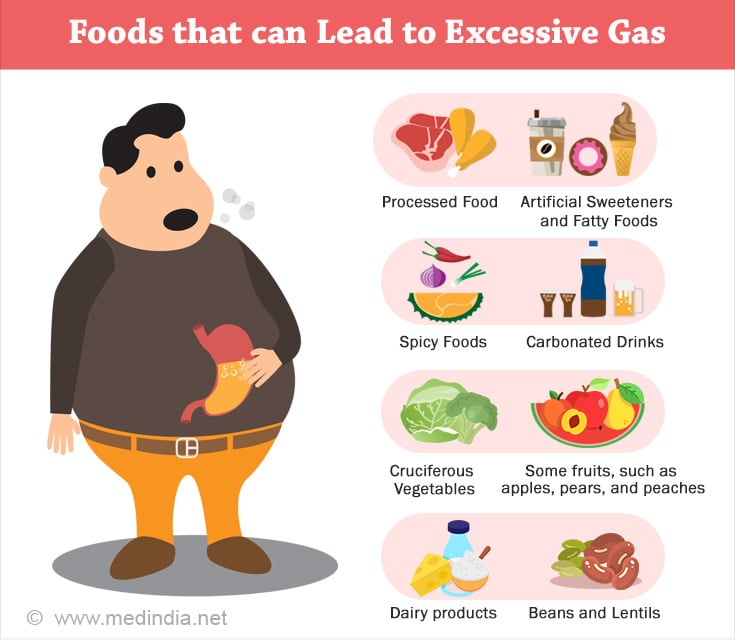- Gas and gas pains - (https://www.mayoclinic.org/diseases-conditions/gas-and-gas-pains/symptoms-causes/syc-20372709)
About
Experiencing excessive gas in the digestive system is a commonplace occurrence as part of the intricate process of digestion. The human body efficiently expels this gas through natural mechanisms like burping or passing gas. However, challenges arise when the gas becomes trapped or encounters obstacles while navigating through the digestive system, leading to gas pain. Understanding the dynamics of this process is vital, as it can shed light on the underlying causes and effective strategies to manage any associated discomfort(1✔ ✔Trusted SourceGas and gas pains
Go to source).
Factors Leading to Gas
- Ingesting air while eating or drinking
- Gas forming in the large intestine due to bacterial fermentation
- High-fiber foods, including beans, fruits, vegetables, and whole grains
- Contributing factors like carbonated beverages, quick eating, straw use, fiber supplements, and sugar substitutes
Digestive System Disorders
Certain digestive system disorders, such as irritable bowel syndrome or celiac disease, can result in increased gas or gas pain, along with other associated symptoms.
Foods that can Cause Excessive Gas
Certain foods are known to cause excessive gas in some individuals. These include:
- Beans and Lentils: Legumes contain high amounts of fiber and complex carbohydrates that can lead to gas production.
- Cruciferous Vegetables: Broccoli, cabbage, cauliflower, Brussels sprouts, and kale are rich in fiber and can cause gas.
- Dairy Products: Lactose intolerance can lead to gas and bloating, so dairy products like milk, cheese, and yogurt may be problematic for some people.
- Whole Grains: Foods high in fiber, such as whole wheat, oats, and brown rice, can contribute to gas production.
- Carbonated Drinks: Carbonated beverages can introduce gas into the digestive system, leading to bloating.
- Artificial Sweeteners: Sugar substitutes like sorbitol, mannitol, and xylitol found in sugar-free gum and certain diet products can cause gas in some individuals.
- Fruits: Some fruits, such as apples, pears, and peaches, contain fructose, which can cause gas in sensitive individuals.
- Fatty Foods: High-fat foods can slow down digestion, leading to fermentation and gas production.
- Spicy Foods: Spices and hot peppers can irritate the digestive tract, causing gas and discomfort in some people.
- Processed Foods: Packaged and processed foods may contain additives and preservatives that can contribute to gas.

Typical Symptoms and Signs
Symptoms:
- Burping or Belching
- Rumbling
- Abdominal Pain and Cramps
- A feeling of fullness or pressure (bloating)
- Passing gas
Sign:
- Observable abdominal distention

Diagnosis of Gas Pain
- Your physician will likely identify the cause of your gas and gas pains by considering your medical history, examining your dietary habits, and conducting a physical examination
- During the physical exam, the doctor may assess your abdomen for tenderness and any abnormalities by touch
- Listening to the sounds of your abdomen with a stethoscope can provide insights into the functioning of your digestive tract
- Additional diagnostic tests may be ordered based on the physical exam findings and the presence of other symptoms like weight loss, blood in the stool, or diarrhea
Treatment of Stomach Pain due to Gas
If your gas pains are linked to an underlying health issue, addressing the root cause may bring relief. Otherwise, managing bothersome gas typically involves dietary adjustments, lifestyle modifications, or over-the-counter medications. While there's no one-size-fits-all solution, most individuals can find relief through a process of trial and error.
Diet for Gas Pain
Making changes to your diet can help reduce gas production or facilitate the movement of gas through your system. Maintaining a diary of your diet and gas symptoms will assist both you and your doctor in determining the best dietary modifications. Considerations may include eliminating certain foods or consuming smaller portions.
Reducing or eliminating the following dietary factors may alleviate gas symptoms:
- High-Fiber Foods: Experimenting with the reduction of high-fiber foods like beans, onions, broccoli, and whole grains. Reintroducing them gradually is advised, with consultation from your doctor to ensure a balanced fiber intake
- Dairy: Decreasing dairy products or opting for lactose-free alternatives and lactase-supplemented milk products for improved digestion
- Sugar Substitutes: Eliminating or reducing the use of sugar substitutes or trying different alternatives
- Fried or Fatty Foods: Cutting back on foods high in dietary fat to expedite gas clearance from the intestines
- Carbonated beverages: Reducing or avoiding the consumption of carbonated drinks
- Fiber Supplements: Adjusting the amount and type of fiber supplement with guidance from your doctor
- Water: Ensuring an adequate water intake to prevent constipation, especially when consuming fiber supplements
Over-the-Counter Remedies
Certain products may help alleviate gas symptoms for some individuals:
- Alpha-Galactosidase: A supplement that aids in breaking down carbohydrates in beans and vegetables when taken before meals
- Lactase Supplements: Assisting digestion of lactose in dairy products, particularly beneficial for those lactose intolerants. Consultation with a doctor is recommended, especially during pregnancy or breastfeeding
- Simethicone: Aids in breaking up gas bubbles and promoting the passage of gas through the digestive tract, although clinical evidence on its effectiveness is limited
- Activated Charcoal: Taken before and after meals, it may reduce symptoms, but research has not conclusively demonstrated its benefits. Note that it might interfere with medication absorption and can cause staining of the mouth and clothing
Managing Discomfort
Understanding the causes and addressing dietary habits are crucial for handling gas-related discomfort. Consultation with a healthcare professional is recommended if symptoms persist or worsen.
When to Visit a Doctor
While the occasional act of burping and passing gas is a natural bodily function, persistent or severe gas that disrupts daily life should prompt a consultation with a healthcare professional.
Medical attention is crucial when gas-related symptoms are coupled with concerning signs, such as:
- Bloody Stools: The presence of blood in stools requires immediate evaluation by a healthcare provider.
- Changes in Stool Consistency or Frequency: Significant alterations in stool characteristics or bowel habits should be discussed with a doctor.
- Weight Loss: Unexplained weight loss along with gas symptoms necessitates a thorough medical assessment.
- Constipation: Persistent difficulty in passing stools may indicate an underlying issue that requires attention.
- Diarrhea: Chronic or severe diarrhea, particularly when accompanied by gas symptoms, warrants medical investigation.
- Persistent Nausea: If feelings of nausea persist despite dietary changes, seeking medical advice is advised.
- Vomiting: Persistent or unexplained vomiting in conjunction with gas symptoms should be addressed promptly.
Immediate care is not only recommended but necessary in the following situations:
- Prolonged Abdominal Pain: If abdominal pain persists for an extended period, it requires immediate medical attention.
- Chest Pain: Immediate medical care is essential when experiencing chest pain in association with gas-related symptoms.
Conclusion
In summary, common symptoms such as burping, passing gas, abdominal pain, cramps, a feeling of fullness, and observable abdominal distention may not always be cause for concern. However, any persistence, severity, or combination with the mentioned signs should prompt individuals to seek medical attention promptly. Regular communication with a healthcare professional is key in ensuring appropriate diagnosis and management of gastrointestinal symptoms.

















